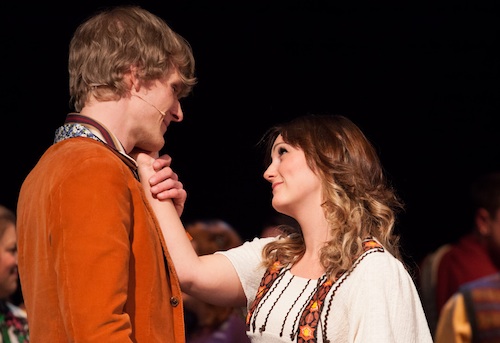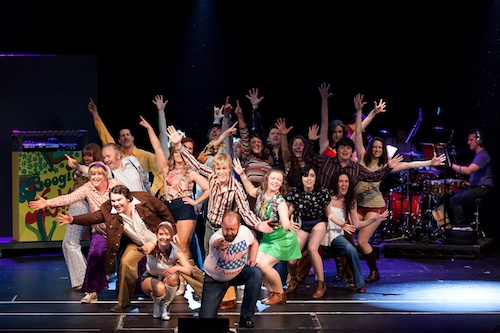Boogie Nights – Review
✭✭✭✩✩ Patchy Fun
Church Hill Theatre
Tues 1 – Sat 5 April 2014
Review by Hugh Simpson
Musically strong, Edinburgh Music Theatre’s Boogie Nights has some excellent moments but overall is a somewhat uneven proposition.
The storyline of Jon Conway’s 1997 musical is beyond flimsy. A group of young people who attend Boogie Nights disco in 1977; one of them, Roddy O’Neil, is an aspiring rock star who finds it difficult to stay faithful to his girlfriend Debs. The storyline is there to link together a string of 70s hits in what has been called the ‘original jukebox musical’.
Whereas some later examples of that genre have had contrived plot twists and character names which signpost upcoming musical numbers, here many of the songs are largely interchangeable. Moreover, few of the songs last their full original length so at least there is plenty of variety.
The essentially functional nature of the plot means that there is very little for an audience to care about, especially as Roddy is such an unsympathetic central figure. He is not the only one, as the 70s setting is apparently an excuse for casual sexism and insensitivity.
The chronology is also slapdash; you do not have to have lived through the decade to spot songs and references that are years later than the supposed setting. This all means that, unless the cast can perform superhuman feats of acting, the show has to keep up an extraordinary level of pace and energy to truly succeed; despite the best efforts of the performers, this does not really happen.
There is something strangely tentative about the whole enterprise. A symptom of this is the YMCA routine. It would be impossible to carry this off at all sheepishly, particularly when the song is renamed CMYA and has a (barely) changed tune, presumably due to a quibble about rights. It needs to be attacked with all guns blazing, and this does not quite happen.
There is certainly no shortage of talent on show. Magnus Hølvold definitely has the looks and the moves for a wannabe frontman. His dancing is a joy to behold as he alternately swaggers and glides across the stage. However, he fails to make us truly care about Roddy, while he is not helped by having his big romantic number, Sorry Seems To Be The Hardest Word, apparently in a key far too low for him.
Mike Davies’s direction is always considered and skilful
Jennifer Good (the long-suffering Debs) and Josephine Heinemeier, who plays Lorraine, one of the many who catches Roddy’s eye, are both outstanding vocally. Their duet on Enough Is Enough is the highlight of the evening, helped as it is by some simple but effective staging.
There is not enough of this kind of help in some of the other numbers; Good’s solo on I Will Survive, while accomplished, is less effective than it could be as a result. Mike Davies’s direction is always considered and skilful, but too often errs on the side of tasteful when throwing the kitchen sink at it might have been more successful.
The decision to move the setting from the original Bromley to an unspecified North of England location also seems puzzling in the light of the hugely varying accents that result, and the question must arise of whether moving further north still to Central Scotland might have made the cast more at home.
Kenneth Pinkerton’s sleazy singer/fixer Spencer seems to suffer particularly, which detracts from his largely successful attempts to bring some poignancy to an outwardly unsympathetic role. Scott Kenneway also manages to bring some pathos to the part of Roddy’s Elvis-obsessed father Eamon.
Nicole Graham and David Doherty successfully eke out some humour from the roles of Debs and Roddy’s friends Trish and Terry, despite having so little to work with; Graham also shines in her solos. Andrew Todman does well as Dean, but the role, like the others, is paper-thin. Hazel Beattie provides some dynamism in a well-thought out warm-up act before the show proper.
It is in the ensemble pieces that the show really comes alive. The more people involved, the more fun it all is, which augurs well for the upcoming singalong night. Choreographer Sarah Aitken makes great use of the large number of performers, while the standard of singing throughout is high. Musical director Neil Metcalfe and his onstage band provide unflagging support, and there is a real sense of fun in some of the big set-piece numbers.
Although the TV Medley is, frankly, a stupid idea, having no reason to be in the show and no musical or logical cohesion; it is also fantastic fun, culminating in a rendition of the theme from Happy Days which is a truly joyous moment, displaying what fun even a sitting-down dance can be if it is done with enough precision and chutzpah. It is a shame that some of what comes between is a little static and lacking in magic, leading to an inconsistent evening.
Running time 2 hours 25 minutes including interval
Run ends Saturday 5 April 2014
Evenings 7.30 pm, Matinee Sat 2.30 pm
NB: Friday 4 April is a one-off special sing-a-long performance.
Church Hill Theatre, 33a Morningside Road, EH10 4DR
Information from: www.edinburghtheatre.co.uk
ENDS




















